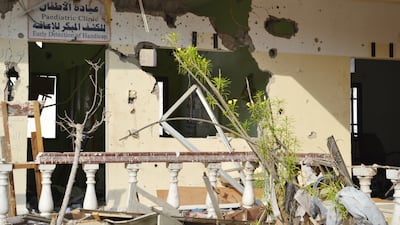ADEN // As loyalists and rebels battled for months to control Aden, Abdullah Awadh feared he would die. But not from the fighting.
Street battles and shelling destroyed much of the southern port city's services, including its hospitals and clinics. It also cut off essential supplies from the outside such as food and medicine. For Mr Awadh, a 55-year-old diabetic, this meant going without insulin for two months.
"I was almost dead because of the severe shortage of medicine," Mr Awadh, a retired soldier, said.
After local resistance fighters, aided by a Saudi Arabia-led coalition of countries that includes the UAE, finally forced the Houthi rebels out of the city in mid-July, the supply of essential medicines improved.
As part of its rehabilitation efforts in Aden, the UAE has not only brought in medicines, but will soon provide specialist equipment such as dialysis machines.
"When the Houthis fled the city, the Emirates provided us with the proper medicine for diabetes," said Mr Awadh.
He has now received a new supply of insulin, and thanks the UAE for "keeping his soul in his body".
Many residents did die because of the lack of medical services during fighting in the city. Reem Abdullah's sister, Hannan, in her 30s, went into labour as heavy clashes raged in Aden's Crater district. She could not be taken to a hospital nor could a doctor come to her. After much suffering, both mother and child died.
"There is a huge difference in the health service between then and now," said Ms Abdullah, a 37-year-old housewife. "During the war, even if you could get to a hospital, you would not get medicines or you would not get the proper doctor. But now I go to the hospital and get the doctors and medicines."
The state-run Al Sadaqah hospital in Sheikh Othman district struggled to treat more than 70 patients a day during the fighting despite a severe shortage of medicines and antibiotics, said Fuad Saleh, the doctor in charge of its medical supplies.
"Right now everything has changed," Dr Saleh said. "The Emirates provided us with all kinds of medicines, so we can say that there is a huge improvement in health services in Aden."
The head of Aden's reconstruction committee, UAE Brigadier General Abdullah Al Dhaheri, said the Emirati effort began with the restocking of medicines and providing the city with electricity so the supplies could be stored properly.
"When I visited the prosthetics hospital, I found around 120 patients waiting, then I felt with them and the Emirates started to rehabilitate the hospital and there will not be a single patient waiting for treatment," Brig Gen Al Dhaheri said.
He said repair of the prosthetics hospital would begin on Sunday and the UAE would provide the hospital with artificial limbs for more than 100 patients.
Work on three other hospitals would begin next week with funds from the Yemen: We Care campaign that is being carried out in the UAE.
"We visited the cancer hospital, too. We all know that cancer drugs are very expensive, but we could provide enough of these medicines for six months," said Brig Gen Al Dhaheri.
Gen Al Dhaheri said in coming days the Emirates would provide patients with kidney failure with their proper medicine as well as more than 48 dialysis machines.
The Emirates Red Crescent has also opened new department to treat kidney diseases at Al Wahadah hospital in Aden's Sheikh Othman District.
"There is also a plan to reconstruct the damaged hospitals, but not right now, as we are looking for immediate solutions," Brig Gen Al Dhaheri said. "We will rebuild the damaged hospitals later as it will take a lot of time to reopen them."
He said work on the hospitals would take about a year.
For now, most of the hospitals that weren't badly damaged have reopened their doors and, with supplies provided by the Emirates, have resumed normal service for the city's patients.
foreign.desk@thenational.ae

Restoring hospitals becomes the priority in Yemen’s Aden
After months of fighting, the focus turns to restarting medical services and providing medicines for chronic illnesses in Yemen's second city, Mohammed Al Qalisi reports.
Most popular today
